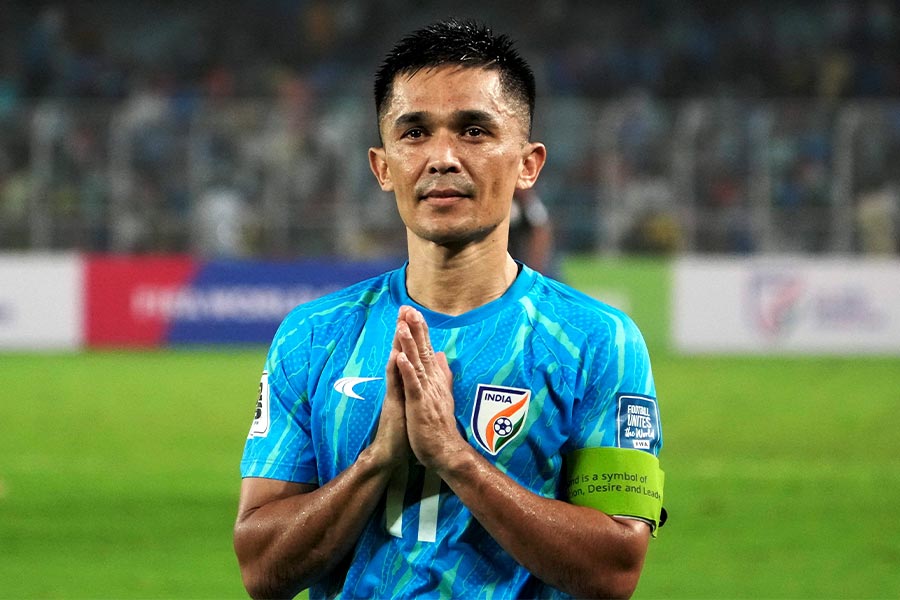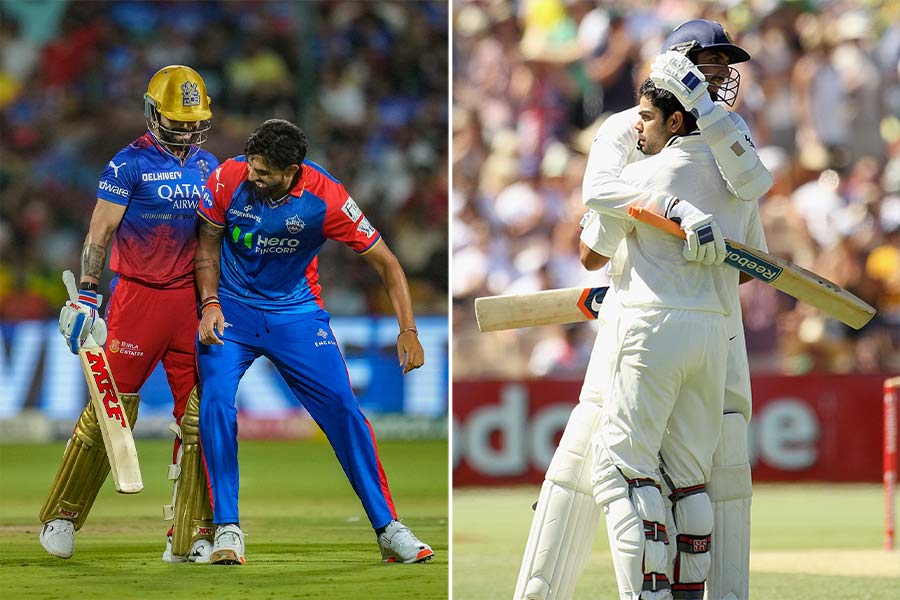“It's not about me and my last match,” said the ever-unassuming skip amid the hullabaloo before June 6. Between the post-IPL chaos and the growing anticipation of the T20 World Cup, between Olympic qualifications and the finale of the Champions League, the most iconic player in Indian football played his last match. Thank you, Sunil Chhetri.
The Salt Lake stadium was packed with fans who tried their very best to cajole the team into a farewell win. But it was not to be. India could only secure a goalless draw against Kuwait, making the home team’s qualification in the FIFA World Cup even more difficult. Fans were left to rue that yet another shot at elevation was passing Indian football by.
Many appreciate Sunil Chhetri because he was the only element that resembled consistency at a tumultuous time in Indian football. That’s not a good thing if you look at the big picture. After all, 305 million Indians consume football (Ormax Media: Sports Audience Report 2024). Many celebrated Argentina’s World Cup win like it was our victory. But the contrast with the Mumbai parade after the T20 World Cup victory is still stark.
You may ponder over this. What makes sports the arena of catharsis? Well, the easy answer is hidden in the following statement: humans overlay their own narratives on events to make sense of what’s happening. The tremendous cocktail of emotions, associations and investment mixed with the jeopardy of surprise makes sports the perfect place to let it all out.
Catharsis: The needed release

Fans behave the way they do because they use sports as a means to express emotions they cannot otherwise Stu Forster/Getty Images
In psychology and psychotherapy, catharsis is the process of releasing emotions. Catharsis looks at a healthy release mechanism. Think of a dam. It does not release the entire water at one go — that is dangerous. Rather, a smaller amount of water is released at a time, that too with a plan. Sports is the stage for collective catharsis, where shared emotions find a unified outlet for profound release through the dramatic arcs of triumph and despair. At a societal level, catharsis stretches back a bit more. In Western philosophy, this was rooted in the Greek dramas of collective catharsis in the hero’s journey of victory and loss. It mostly happens in absolutes. In Indian philosophy, catharsis is intertwined with meaning and emotional purification. Catharsis is linked to “rasa” in Sanskrit, which is linked to the emotional essence experienced through external activities such as art, music and literature. We then arrive at the ‘navarasa’, the nine emotional states. In psychological terms, these are the fundamental emotions. All other emotions are a combination of them. For example, joy and peace combine to create contentment.
An effective process of releasing emotions is through systematic self-reflection and it can help us achieve equilibrium. This release can also be extended to how people behave in relation to others. Think of fans who behave the way they do because they use sports as a means to express emotions they cannot otherwise (or are not permitted to exhibit elsewhere). When they chant, they are letting it out. When they abuse the umpire or referee, they are voicing their frustration. When they hope a player pulls a team through, they hope the player will spare them the insecurity they feel about losing. And thus catharsis unfolds, gradually, not suddenly, like a lightbulb switching on.
Think of the electrifying atmosphere of a tournament final. The buildup of anticipation is palpable, with fans and athletes both holding their breath. As the game unfolds, every movement, every play, becomes a conduit for collective emotion. This is the peak emotional experience for you. When an athlete scores a winning goal or breaks a record, the resulting euphoria is not just personal but shared by all present, a cascade of relief (or disappointment, if you are on the other side). Their failure is your failure, their success is yours. Psychologically, we have transported ourselves within the narrative of the game and allowed ourselves to actually live through them.
What about the athletes? They are the actors in the theatre for catharsis that a sporting field creates. They train years for ‘the moment’ that captures within it everything that they have experienced and put themselves through. They are the hero in their story, the one who triumphs over difficult trials. After all, who can forget the scenes from India’s recent T20 World Cup win. We feel like they represent us, too, which is why lakhs went for the parade in Mumbai (I personally know people who sacrificed their exam preparation to be there).

We feel athletes represent us, too, which is why lakhs went for the parade in Mumbai PTI
Let it out!
Catharsis is essential for our emotional health. Many men do it through sports, especially in India. But all humans find themselves between their old hopes and new ambitions, within the narratives of comeback stories and underdog victories. They are the mirrors that reflect our innate desire for hope and redemption. Why? Because sports and our lives share another thing in common: we have no idea how it will all play out. We can merely prepare and try to take the brave decisions when things come our way. To paraphrase Dumbledore, it takes a great deal of courage to make brave decisions, but just as much to let our emotions out after the outcomes of the decisions.
Dr Sahen Gupta is a Kolkata-born, India- and UK-based psychologist who divides his time between mental health support and high-performance coaching. As the founder of Discovery Sport & Performance Lab, he works not only with Olympians and other top-level sportspersons, but also with CEOs and other professionals striving for excellence. Dr Gupta’s mission is to simplify complexities of the mind into actionable and simple ‘doables’ that allow individuals to be mentally fit.




